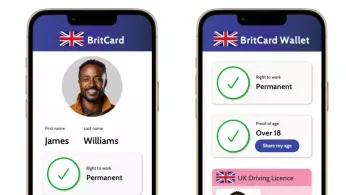
4 hours ago
UK Government’s Digital ID Scheme Sparks Alarm Among Transgender Community Over Privacy and Safety
READ TIME: 4 MIN.
The UK government, led by Prime Minister Sir Keir Starmer, formally announced plans to introduce a nationwide mandatory digital identification system for all working adults on 25 September 2025. The proposed 'Brit Card' will serve as a digital credential stored on smartphones, intended to verify identity, right to work, and access to public services. Officials assert that the scheme aims to tackle illegal migration and streamline bureaucratic processes, positioning it as an “important part” of what Starmer calls “patriotic renewal” for the country .
However, the announcement was met with swift and significant opposition. Within 24 hours of the scheme’s unveiling, a parliamentary petition demanding its withdrawal amassed nearly 800,000 signatures, reflecting widespread unease about its implications for privacy, civil liberties, and digital security . Civil rights organizations and cybersecurity experts have described the policy as “intrusive” and potentially dangerous, echoing past controversies that led to the abandonment of similar proposals in the late 2000s and again in the 2010s .
Transgender people and LGBTQ+ advocacy groups have voiced acute concerns that the Brit Card could jeopardize the privacy and safety of trans and non-binary individuals. Questions have emerged over whether the digital IDs will accurately reflect a person’s affirmed gender, especially for those holding Gender Recognition Certificates (GRCs)—the legal documentation used to change gender markers in the UK. Many trans people fear the scheme could require them to disclose their sex assigned at birth, effectively outing them in workplaces and public settings .
Olivia Campbell-Cavendish LLB, founder of the Trans Legal Clinic, argued that the proposal “effectively forces the outing of trans people,” warning that it marks a “dangerous escalation in the erosion of civil liberties, human rights, and the fundamental right to privacy.” Campbell-Cavendish emphasized that any digital identification system must ensure that individuals’ lived and legally recognized genders are respected, as required under European and international law .
Not A Phase, a UK-based trans advocacy charity, echoed these concerns in a public statement: “If we’re hypothetically headed towards a future where trans people will be outed by the digital ID documents they possess, this could have a monumental impact on the right to disclosure every trans+ person deserves. We should be gravely concerned about any potential documentation which forces a person’s transness to be more broadly known” .
The anxiety surrounding the Brit Card is not limited to privacy concerns. Advocacy groups and legal experts warn that the scheme could expose trans and non-binary people to discrimination, harassment, and violence if their gender history is revealed without their consent. According to campaigners, the system could be weaponized by anti-trans groups and policymakers seeking to restrict trans rights, including the ability to use gendered facilities or access gender-affirming healthcare .
Keyne Walker, strategy director at TransActual, stated, “Even before the plans were announced, anti-trans groups have already been lobbying ministers, civil servants and right-wing parliamentarians to ensure that the single governmental record held lists trans people as their ‘birth sex’. This scheme could easily be weaponised and hijacked by MPs who are already trying to push anti-trans policies through Parliament” .
While government mock-ups of the Brit Card currently omit a sex marker, campaigners remain skeptical, citing ongoing efforts by government officials to require public institutions to record sex assigned at birth. The possibility that such information may be tied to digital IDs has alarmed many, who fear it could facilitate unwanted disclosure and undermine the protections that GRCs provide .
Beyond the specific concerns of the trans community, broader civil liberties groups have criticized the digital ID scheme as a step towards “mass surveillance and digital control.” Privacy experts argue that the centralized collection of sensitive personal data increases the risk of breaches and misuse, particularly if the system is not designed with robust safeguards .
Opponents have also questioned the scheme’s practicality, noting that some individuals—especially older adults, people with disabilities, and those without access to smartphones—may struggle to comply with the requirements. A Reddit user highlighted these challenges, saying: “My mum just can’t do technology, and my dad has advanced Parkinson’s – there’s no way he’s using a touchscreen device” .
The government asserts that the Brit Card will be free of charge and based on existing GOV.UK ‘One Login’ infrastructure, including name, date of birth, nationality, residency status, and a biometric photo. A public consultation is planned regarding the inclusion of address details and other data points .
The concept of mandatory ID cards has a contentious history in the UK. Previous attempts to implement similar systems were abandoned following public outcry, with critics labeling them as “intrusive, ineffective, and enormously expensive” . Other countries, including France, China, and the United Arab Emirates, have introduced digital ID systems, often accompanied by debates over privacy and human rights .
In the UK, the current proposal arrives amid heightened scrutiny of trans rights and a documented rise in hate crimes against transgender people, with statistics showing a 186% increase from 2018 to 2023 . Advocates urge lawmakers to consider the unique vulnerabilities faced by transgender individuals in any digital identification policy.
As the government prepares to move forward with legislation, LGBTQ+ organizations and legal experts are calling for robust safeguards to protect trans and non-binary people from forced disclosure and discrimination. They emphasize the need for meaningful consultation with affected communities and adherence to international human rights standards.
Trans Legal Clinic’s Olivia Campbell-Cavendish concluded, “Any system of digital identification must ensure that the gender in which a person navigates the world is accurately and lawfully recognised. This principle is not up for debate, it is enshrined in European and international law, and was recently reaffirmed by the European Court of Justice” .
As debate continues, many in the LGBTQ+ community remain vigilant, urging transparency and accountability from the government to prevent the Brit Card scheme from becoming a tool of surveillance, discrimination, or harm.






